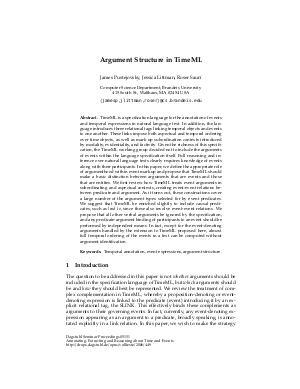Argument Structure in TimeML
Authors James Pustejovsky, Jessica Littman, Roser Sauri
-
Part of:
Volume:
Dagstuhl Seminar Proceedings, Volume 5151
Part of: Series: Dagstuhl Seminar Proceedings (DagSemProc) - License:
 Creative Commons Attribution 4.0 International license
Creative Commons Attribution 4.0 International license
- Publication Date: 2006-01-23
File

PDF
DagSemProc.05151.4.pdf
- Filesize: 423 kB
- 14 pages
Document Identifiers
Subject Classification
Keywords
- Temporal annotation
- event expressions
- argument structure
Metrics
- Access Statistics
-
Total Accesses (updated on a weekly basis)
0Document
0Metadata
Abstract
TimeML is a specification language for the annotation of events and temporal expressions in natural language text. In addition, the language introduces three relational tags linking temporal objects and events to one another. These links impose both aspectual and temporal ordering over time objects, as well as mark up subordination contexts introduced by modality, evidentiality, and factivity. Given the richness of this specification, the TimeML working group decided not to include the arguments of events within the language specification itself. Full reasoning and inference over natural language texts clearly requires knowledge of events along with their participants. In this paper, we define the appropriate role of argumenthood within event markup and propose that TimeML should make a basic distinction between arguments that are events and those that are entities.
We first review how TimeML treats event arguments in subordinating and aspectual contexts, creating event-event relations between predicate and argument.
As it turns out, these constructions cover a large number of the argument types selected for by event predicates. We suggest that TimeML be enriched slightly to include causal predicates, such as {it lead to}, since these also involve event-event relations. We propose that all other verbal arguments be ignored by the specification, and any predicate-argument binding of participants to an event should be performed by independent means. In fact, except for the event-denoting arguments handled by the extension to TimeML proposed here, almost full temporal ordering of the events in a text can be computed without argument identification.
Cite As Get BibTex
James Pustejovsky, Jessica Littman, and Roser Sauri. Argument Structure in TimeML. In Annotating, Extracting and Reasoning about Time and Events. Dagstuhl Seminar Proceedings, Volume 5151, pp. 1-14, Schloss Dagstuhl – Leibniz-Zentrum für Informatik (2006)
https://doi.org/10.4230/DagSemProc.05151.4
BibTex
@InProceedings{pustejovsky_et_al:DagSemProc.05151.4,
author = {Pustejovsky, James and Littman, Jessica and Sauri, Roser},
title = {{Argument Structure in TimeML}},
booktitle = {Annotating, Extracting and Reasoning about Time and Events},
pages = {1--14},
series = {Dagstuhl Seminar Proceedings (DagSemProc)},
ISSN = {1862-4405},
year = {2006},
volume = {5151},
editor = {Graham Katz and James Pustejovsky and Frank Schilder},
publisher = {Schloss Dagstuhl -- Leibniz-Zentrum f{\"u}r Informatik},
address = {Dagstuhl, Germany},
URL = {https://drops.dagstuhl.de/entities/document/10.4230/DagSemProc.05151.4},
URN = {urn:nbn:de:0030-drops-4498},
doi = {10.4230/DagSemProc.05151.4},
annote = {Keywords: Temporal annotation, event expressions, argument structure}
}
